<Back to Index>
- First Secretary of the Communist Party of Czechoslovakia Alexander Dubček, 1921
- Member of the Central Committee of the Communist Party of Czechoslovakia Ota Šik, 1919
PAGE SPONSOR
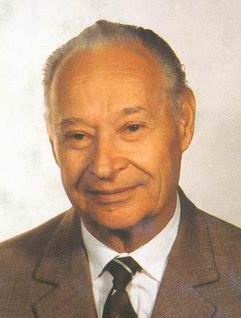
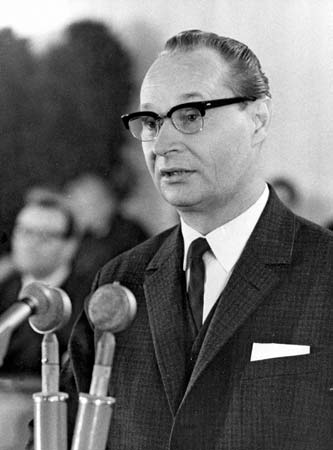
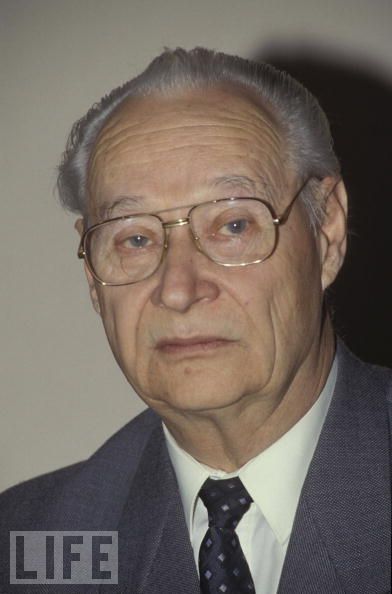
Alexander Dubček (27 November 1921 – 7 November 1992) was a Slovak politician and briefly leader of Czechoslovakia (1968 – 1969), famous for his attempt to reform the communist regime during the Prague Spring. Later, after the overthrow of the government in 1989, he was Chairman of the federal Czecho - Slovak parliament.
Dubček was born in Uhrovec, Czechoslovakia (Slovakia), and raised in the Kyrgyz SSR of the Soviet Union (now Kyrgyzstan) as a member of the Esperantist industrial cooperative Interhelpo. His father, Štefan, moved from Chicago to Czechoslovakia after World War I, when he refused to serve in the military for his pacifism. Alexander Dubček was conceived in Chicago, but born after the family relocated to Czechoslovakia. When Alexander Dubček was three, the family moved to the Soviet Union, in part to help build socialism and in part because jobs were scarce in Czechoslovakia. In 1938 the family returned to Czechoslovakia.
During the Second World War, Alexander Dubček joined the underground resistance against the wartime pro - German Slovak state headed by Jozef Tiso. In August 1944, Dubček fought in the Slovak National Uprising and was wounded. His brother, Július, was killed.
During the war, Alexander Dubček joined the Communist Party of Slovakia (KSS), which had been created after the formation of the Slovak state and in 1948 was transformed into the Slovak branch of the Communist Party of Czechoslovakia (KSČ).
After the war, he steadily rose through the ranks in Communist Czechoslovakia. From 1951 to 1955 he was a member of the National Assembly, the parliament of Czechoslovakia. In 1953, he was sent to the Moscow Political College, where he graduated in 1958. In 1955 joined the Central Committee of the Slovak branch and in 1962 became a member of the presidium. In 1958 he also joined the Central Committee of the Communist Party of Czechoslovakia, which he served as a secretary from 1960 to 1962 and as a member of the presidium after 1962. From 1960 to 1968 he once more was a member of the federal parliament.
In 1963, a power struggle in the leadership of the Slovak branch unseated Karol Bacílek and Pavol David, hard line allies of Antonín Novotný, First Secretary of the KSČ and president of Czechoslovakia. In their place, a new generation of Slovak Communists took control of party and state organs in Slovakia, led by Alexander Dubček, who became First Secretary of the Slovak branch of the party.
Under Dubček's leadership, Slovakia began to evolve toward political liberalization. Because Novotný and his Stalinist predecessors had denigrated Slovak "bourgeois nationalists", most notably Gustáv Husák and Vladimír Clementis,
in the 1950s, the Slovak branch worked to promote Slovak identity. This
mainly took the form of celebrations and commemorations, such as the
150th birthdays of 19th century leaders of the Slovak National Revival Ľudovít Štúr and Jozef Miloslav Hurban, the centennial of the Matica slovenská in
1963, and the twentieth anniversary of the Slovak National Uprising. At
the same time, the political and intellectual climate in Slovakia
became freer than that in the Czech Lands. This was exemplified by the
rising readership of Kultúrny život,
the weekly newspaper of the Union of Slovak Writers, which published
frank discussions of liberalization, federalization and democratization,
written by the most progressive or controversial writers – both Slovak
and Czech. Kultúrny život consequently became the first Slovak publication to gain a wide following among Czechs.
Under Communism, the Czechoslovak economy in the 1960s was in serious decline and the imposition of central control from Prague disappointed local Communists while the destalinization program caused further disquiet. In October 1967, a number of reformers, most notably Ota Šik and Alexander Dubček, took action: they challenged First Secretary Antonín Novotný at a Central Committee meeting. Novotný faced a mutiny in the Central Committee, so he secretly invited Leonid Brezhnev, the Soviet leader, to make a whirlwind visit to Prague in December 1967 in order to shore up the embattled Novotný. When Brezhnev arrived in Prague and met with the Central Committee members, he was stunned to learn of the extent of the opposition to Novotný, leading Brezhnev to withhold support and paving the way for the Central Committee to remove Novotný. Dubček became the new First Secretary of the Communist Party of Czechoslovakia on 5 January 1968.
The period following Novotný's downfall became known as the Prague Spring. During this time, Dubček and other reformers sought to liberalize the Communist regime, creating "socialism with a human face". Though this loosened the party's grip on the country, Dubček remained a devoted Communist and intended to preserve the party's rule. However, during the Prague Spring, he and other reform minded Communists sought to win popular support for the Communist regime by eliminating its worst, most repressive features, allowing greater freedom of expression and tolerating political and social organizations not under Communist control. "Dubcek! Svoboda!" became the popular refrain of student demonstrations during this period. Yet Dubček found himself in an increasingly untenable position. The program of reform gained momentum, leading to pressures for further liberalization and democratization. At the same time, hard line Communists in Czechoslovakia and the leaders of other Warsaw Pact countries pressured Dubček to rein in the Prague Spring. Though Dubček wanted to keep control of the reform movement, he refused to resort to any draconian measures to do so.
The
Soviet leadership tried to stop or limit the changes in the ČSSR
through a series of negotiations. The Soviet Union agreed to bilateral
talks with Czechoslovakia in July at Čierna nad Tisou, near the
Slovak - Soviet border. At the meeting, Dubček tried to reassure the
Soviets and the Warsaw Pact leaders that he was still friendly to
Moscow, arguing that the reforms were an internal matter. He thought he
had learned an important lesson from the failing of the Hungarian Revolution of 1956,
believing the Kremlin would allow him a free hand in pursuing domestic
reform as long as Czechoslovakia remained a faithful ally of the Soviet
Union, under Communist rule. Despite Dubček's continuing efforts to
stress these commitments, Brezhnev and other Warsaw Pact leaders
remained wary.
On the night of 20 – 21 August 1968, Warsaw Pact forces entered Czechoslovakia. The occupying armies quickly seized control of Prague and the Central Committee's building, taking Dubček and other reformers into Soviet custody. But before they were arrested, Dubček urged the people not to resist. Later in the day, Dubček and the others were taken to Moscow on a Soviet military transport aircraft (reportedly one of the aircraft used in the Soviet invasion).
Despite the inspired nonviolent resistance of the Czech and Slovak population, the reformers had little hope of holding out against Soviet pressure and ultimately were forced to accede to Soviet demands, signing the Moscow protocols. (Only František Kriegel refused to sign.)
Dubček and most of the reformers were returned to Prague on 27 August and Dubček retained his post as the party's first secretary for a while. Indeed, the achievements of the Prague Spring were not reversed overnight, but over a period of several months.
In January 1969, Dubček was hospitalized in Bratislava complaining of a cold and had to cancel a speech. Rumors sprang up that his illness was radiation sickness and that it was caused by radioactive strontium being placed in his soup during his stay in Moscow in an attempt to kill him. However, a U.S. intelligence report discounted this for lack of evidence.
Dubček was forced to resign as first secretary in April 1969 following the Czechoslovak Hockey Riots. He was re-elected to the Federal Assembly (as the federal parliament was now called) and became its Speaker. He was later sent as ambassador to Turkey (1969 – 70),
allegedly in the hope that he would defect to the West, which however
did not occur. In 1970, he was expelled from the Communist party and lost his seats in the Slovak parliament (which he had held continuously since 1964) and the Federal Assembly.
After his expulsion from the party, Dubček worked in the Forestry Service in Slovakia. He remained a popular figure among the Slovaks and Czechs he encountered on the job, using this reverence to procure scarce and hard - to - find materials for his workplace. Dubček and his wife, Anna, continued to live in a comfortable villa in a nice neighborhood in Bratislava. In 1988, Dubček was allowed to travel to Italy to accept an honorary doctorate from Bologna University, and while there he gave an interview with Italian newspaper L'Unità, his first public remarks to the press since 1970. Dubček's appearance and interview helped to return him to international prominence.
In 1989, he was awarded the annual Sakharov Prize in its second year of existence.
During the Velvet Revolution of 1989, he supported the Public against Violence (VPN) and the Civic Forum. On the night of 24 November, Dubček appeared with Václav Havel on a balcony overlooking Wenceslas Square, He was greeted with uproarious applause from the throngs of protesters below, embraced as a symbol of democratic freedom. He disappointed the crowd somewhat by calling for pruning out what was wrong with Communism. By this time, however, the demonstrators in Prague wanted nothing to do with Communism of any sort. Later that night, Dubček was on stage with Havel at the Laterna Magika theater, the headquarters of Civic Forum, when the entire leadership of the Communist Party resigned -- in effect, ending Communist rule in Czechoslovakia.
Dubček was elected Chairman of the Federal Assembly (Czecho - Slovak Parliament) on 28 December 1989, and re-elected in 1990 and 1992.
At the time of the overthrow of Communist party rule, Dubček described the Velvet Revolution as a victory for his humanistic socialist outlook. In 1990, he received the International Humanist Award from the International Humanist and Ethical Union.
In 1992, he became leader of the Social Democratic Party of Slovakia and represented that party in the Federal Assembly. At that time, Dubček passively supported the union between Czechs and Slovaks in a single Czecho - Slovak federation against the (ultimately successful) push towards an independent Slovak state.
Dubček died on 7 November 1992, as a result of injuries sustained in car crash that took place on 1 September on the Czech D1 highway, near Humpolec. He was buried in Slávičie údolie cemetery in Bratislava, Slovakia.
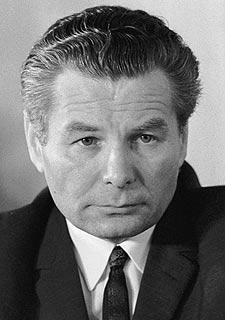
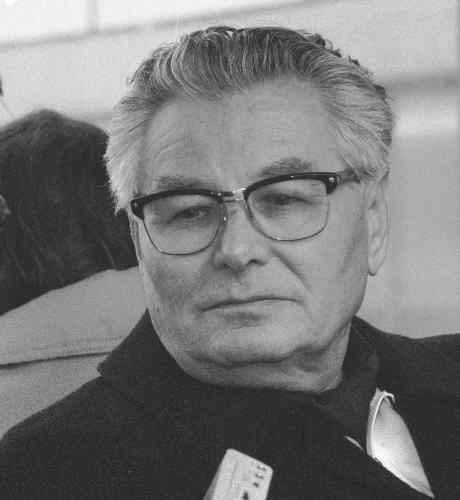
Ota Šik (September 11, 1919 – August 22, 2004) was a Czech economist and politician. He was the man behind the New Economic Model (economy liberalization plan) and was one of the key figures in the Prague Spring.
Šik was born in the industrial town of Plzeň, Czechoslovakia. Before the Second World War Šik studied Art at Charles University of Prague, and studied politics after the war.
Following the German annexation of the Sudetenland, and the partition of the whole nation in March 1939, Šik joined the Czech Resistance movement. However, he was arrested by the Gestapo in 1940 and sent to the Mauthausen - Gusen concentration camp. At Mauthausen Šik's fellow inmates included Antonín Novotný, the future president of Czechoslovakia (who was succeeded by the leader of the Prague Spring Alexander Dubček), and Dubček's father, Štefan.
The connections that Šik made at Mauthausen proved useful in his post war political career. In the early 1960s he attempted to persuade the hardline president, Novotný, into loosening his rigid adherence to central planning, which had been crippling the economy. Šik, who by this point was an economics professor and member of the Communist party, wanted to bring market elements into central planning, to relax price controls and to promote private enterprise in the hope of kick - starting the stagnant economic climate. It was around this point that Šik was elected to the party's central committee and was made head of the economics institute at the Czech Academy of Sciences.
Šik's reforms were launched in 1967, before Dubček came to power, but were heavily watered down by party apparatchiks who worried about losing control of the factories. The only palpable, and certainly the most popular, result of the reforms was the appearance of private taxis on the streets of Prague. In December 1967, at a party meeting that was a precursor to Dubček's coup a month later, Šik publicly denounced Novotný's regime. He demanded a fundamental change to the Communist system and a new leadership, two decades before Mikhail Gorbachev, he announced that economic reform could not be separated from fundamental political change. By this point Czechoslovakia had the lowest growth rates in the Soviet bloc, whereas previously it had been the economic backbone of the Habsburg empire.
Following
Dubček's successful coup, Šik was made a deputy prime minister in April
1968 and he was the architect of the economics section of Dubček's action program. Šik claimed that if his policies were followed then Czechoslovakia would be on an economic par with neighboring Austria within four years. However these plans were never followed out after the Prague Spring was brutally suppressed in August of the same year by the tanks of the Red army.
When the tanks rolled into Prague, Šik was on holiday in Yugoslavia. With the threat of arrest looming, he never returned to his homeland. Leonid Brezhnev and the Soviet Communist Party's propaganda machine singled Šik out for particular attention. In August 1968, TASS issued a press release calling him an agent of U.S. imperialism and "one of the most odious figures of the right wing revisionists".
Šik left Yugoslavia in October 1968 and moved to Switzerland. In 1969, he returned to Prague and tried to convince his colleagues but his views were rejected. So he returned to Switzerland where he became an economics professor at the University of St. Gallen in 1970. He held the post until he retired in 1990. After the Velvet Revolution Šik became an economic advisor to the Czech president but had no impact on actual economic policies. He became a Swiss citizen and lived there until his death.